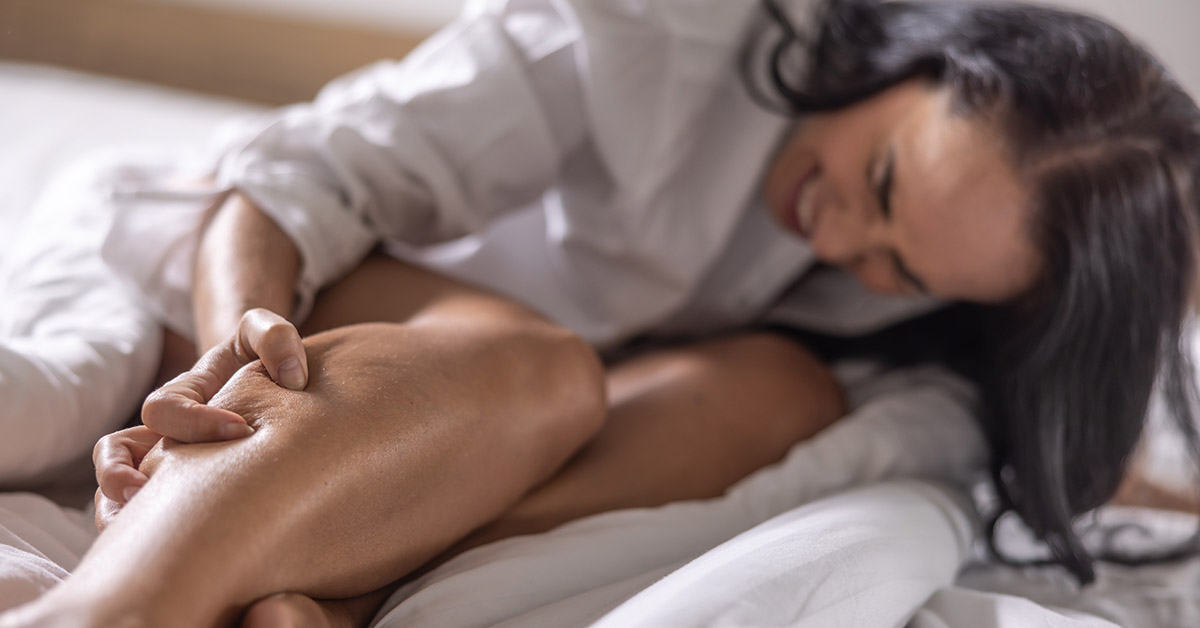Imagine you’re lying down enjoying your evening, and then your lower leg seizes with such an intense pain that makes you want to scream. The pain doesn’t let up, and your muscle stays hard to the touch, this is a nighttime muscle cramp. Also known as nocturnal leg cramps, they can be severely painful and disruptive to your sleep. Here’s a detailed look at what these cramps mean and how to manage them.
1. What Are Nocturnal Leg Cramps?

Nocturnal leg cramps, often referred to as muscle spasms or charley horses, occur when one or more of your leg muscles tightens involuntarily. These cramps usually affect the calf muscles but can also occur in the quadriceps and hamstrings. They can strike without warning while you’re awake or asleep and often resolve themeslves within 10 minutes, but the soreness can linger for the rest of the day. Up to 60 percent of adults experience these cramps, with women and older adults being the most susceptible.1
Read More: 13 of The Best Natural Muscle Relaxers to Help With Cramps
2. Common Causes of Nighttime Leg Cramps

The exact cause of nocturnal leg cramps isn’t well understood, but several factors may contribute to their occurrence. These include:
- Foot Position: Sleeping with your feet and toes pointing away from the body (plantar flexion) shortens your calf muscles, making them prone to cramping.
- Sedentary Lifestyle: LacA l of regular muscle stretching can lead to cramps.
- Muscle Overexertion: Overworking your muscles with excessive exercise can also cause cramps.
- Improper Sitting Positions: Sitting with your legs crossed or toes pointed for extended periods can shorten calf muscles.
- Prolonged Standing: Standing for long periods can increase the risk of cramps.
- Abnormal Nerve Activity: Increased and abnormal nerve firing has been associated with cramps as well.
3. Associated Medical Conditions and Medications

Nocturnal leg cramps can sometimes be a signal of other health conditions or side effects lurking beneath the surface. Pregnancy, flat feet, motor neuron disease, Parkinson’s disease, diabetes, and cardiovascular issues can all increase the likelihood of cramps.2 Certain medications, like diuretics and statins, are also linked to a higher risk of leg cramps.
4. Preventing Nighttime Leg Cramps

To reduce the how often and how bad of your leg cramps get, consider these preventative measures:
- Hydration: Maintain proper hydration throughout the day for optimal muscle function.
- Stretching: Stretch your calves and hamstrings before bed.
- Exercise: Engage in some light exercise, like riding a stationary bike, before sleep.
- Sleeping Position: Avoid sleeping while pointing your feet. Sleeping on your back with a pillow under your knees may help.
- Footwear: Wear supportive footwear to prevent nerve and muscle strain in the feet and legs during the day.
5. Treating Nighttime Leg Cramps

While the cramps can be intensely painful, they usually aren’t serious. Here are some ways to lessen the cramps when they come:
- Massage: Gently knead the affected muscles to help them relax.
- Stretch: Straighten your leg and flex your foot towards you to stretch the cramped muscle.
- Walk on Heels: Walking on your heels can engage opposing muscles to relieve the cramp.
- Apply Heat: Use a hot towel, heating pad, or warm bath to soothe tight muscles.
- Drink Pickle Juice: Some evidence suggests that a small amount of pickle juice may help relieve cramps. This is due to the electrolyte and salt content in the brine.
- Painkillers: Over-the-counter painkillers like ibuprofen or acetaminophen can alleviate soreness post-cramp.
6. When to See a Doctor

If frequent cramps are disrupting your sleep, consult a doctor. They may prescribe muscle relaxants or identify underlying conditions contributing to the cramps. It’s important to address any related health issues, such as diabetes or cardiovascular conditions, to manage cramps effectively.
Conclusion

Nighttime leg cramps are painful but usually not a sign of a serious problem. Implementing preventative strategies like proper hydration, stretching, and adjusting sleeping positions can help reduce their occurrence. If cramps persist, seek medical advice to explore further treatment options and manage any underlying health conditions.
Read More: 10 Causes of Leg Cramps At Night and How to Fix The Problem
Sources
- “What’s Causing Your Leg Cramps at Night? Treatment and Prevention Tips.” Healthline. Carly Vandergriendt. March 15, 2023
- “What Medications Can Cause Leg Cramps At Night, And How Can You Treat or Prevent Them?” GoodRx. Stacia Woodcock, PharmD. April 24, 2024.

